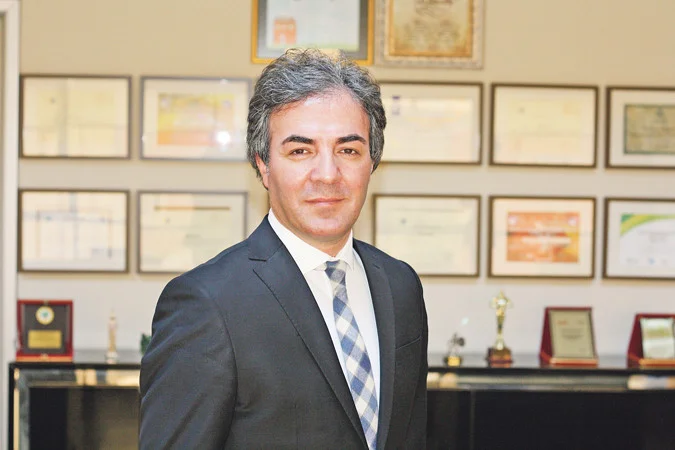Emphasizing that Burkasan has grown with its investments in the recycling sector, Birhan Denktaş stated that they brought Turkey’s first closed-circuit and automated electronic waste recycling facility to Turkey with an investment of 20 million TL in 2014.
Vedat Kılıç, President of the Association of Recyclable Waste Materials Industrialists (TÜDAM), the representative of licensed enterprises in Turkey’s waste management and recycling sector, said that TÜDAM has been carrying out its activities since the day it was founded in order to bring waste to the national economy in a healthy and sustainable manner and to evolve the sector into a recycling industry.
In 2005, with the Regulation on the Control of Packaging Wastes published in 2005, the sector gained a legal identity, and although the sector has progressed with a certain momentum in the last 15 years, he explained that the targets for recycling have not been fully achieved.
Emphasizing that Burkasan has grown with its investments in the recycling sector, Birhan Denktaş stated that they brought Turkey’s first closed-circuit and automated electronic waste recycling facility to Turkey with an investment of 20 million TL in 2014.
Vedat Kılıç, President of the Association of Recyclable Waste Materials Industrialists (TÜDAM), the representative of licensed enterprises in Turkey’s waste management and recycling sector, said that TÜDAM has been carrying out its activities since the day it was founded in order to bring waste to the national economy in a healthy and sustainable manner and to evolve the sector into a recycling industry.
In 2005, with the Regulation on the Control of Packaging Wastes published in 2005, the sector gained a legal identity, and although the sector has progressed with a certain momentum in the last 15 years, he explained that the targets for recycling have not been fully achieved.

“We spend 1 billion lira to bury waste”
Kılıç pointed out that when we divide the waste management sector in Turkey into industrial and domestic sources, we see two different results and said the following: “While industrial wastes are largely collected separately and brought into the economy, unfortunately, we are weak in the packaging wastes of domestic origin. In our country, 34 million tons of domestic waste is generated annually and 7.5 million tons of this waste is recyclable. These recyclable wastes, which have an economic value of 6.5 billion TL, are unfortunately buried in landfills with other wastes because we cannot collect them separately. The irony is that we have to spend another 1 billion TL from the public pocket through municipalities to bury the waste that we cannot collect separately in landfills.”
“Waste management turned into environmental policy”
Noting that these data clearly show that recycling is the effective recovery of recyclable waste from domestic sources, Kılıç said, “Happily, 2018 was an extremely important and promising year for the future of the recycling sector. First, the “Zero Waste Project” launched under the auspices of Emine Erdoğan, the wife of President Recep Tayyip Erdoğan, and then the amendments made to the environmental law at the end of the year have given us, as sector representatives, a lot of hope for the future. In the light of these developments, we can understand that recycling and waste economy is now considered as an environmental policy at the highest administrative level of our state. Undoubtedly, the vision of the Zero Waste Project is of critical importance for the future of the waste management and recycling sector.”
Kılıç defined this vision as “achieving a 35 percent recovery rate in domestic packaging waste for 2023, providing direct employment for 100 thousand people in the waste management and recycling sector, thus reducing the current account deficit by 8 percent by earning 20 billion TL.
Noting that there are practices that support these targets, Kılıç said, “With the Regulation on the Control of Packaging Waste, which was revised at the beginning of 2018, a quota for the use of recycled raw materials for packaged products was introduced. In addition, with the amendments made in the environmental law, ‘recovery participation share’ was introduced for marketers and shopping bags started to be sold for money.
As I mentioned, waste management and recycling has become an environmental policy of our state with the amendments made. As an association, we attach great importance and support these steps taken by our government. As a result of these steps, we believe that the financing problem, which is the biggest obstacle to the collection of recyclable wastes generated at home, will be eliminated and that in the near future, wastes will be collected separately at source and will be brought to the national economy.”
“Technical and technological infrastructure should be strengthened”
Pointing out that changing laws, setting targets and even providing financial resources to achieve these targets is not enough on its own, Kılıç said, “When waste collection rates increase, we also need to create a system that will collect, sort by type and recycle waste. At this point, we need to strengthen the technical and technological infrastructure of our country’s waste management and recycling sector. We have to admit that the infrastructure of our facilities for domestic waste is not sufficient and is extremely primitive compared to European examples. Therefore, in order to reach the targets set, we need to invest in facilities with strong technological infrastructures. In order for new investments to be realized, first of all, we need to ensure investable market conditions and then direct and indirect incentives from the government.”
“Benefiting from fifth region incentives”
In 2018, one of the promising developments for the sector was the amendment made to the incentive system, Kılıç said: “With the amendment, the waste management and recycling sector was included among the ‘investment subjects to be supported with priority’ and in this context, investments to be realized over 5 million TL started to benefit from the fifth region incentives regardless of the region where the investment is made. As a result of the ‘Recycling Sector Incentive Report’ prepared by our association and numerous meetings with the relevant government agencies, we believe that this incentive is extremely important for our sector. We believe that with this environmental policy put forward by our government, more special incentives will be provided for the development of our sector and thus, both domestic and foreign investors will realize important investments with strong technological infrastructure in the waste management sector.”
“Let 2018 be a milestone”
Stating that waste management and recycling sector will be one of the most important agenda items of our country in the next 10 years, Kılıç said, “In order to achieve the results we want at this point, we need a total awareness and action plan from the public to industrialists, from the state to licensed sector representatives. As TÜDAM, we want to believe that 2018 will be the milestone of our country’s recycling mobilization. We now need to build an accurate, healthy and sustainable waste management system that will make up for the time we have lost in the past. In this direction, all members of the association are ready to put their hands under the stone.”

